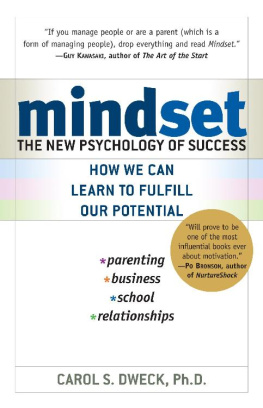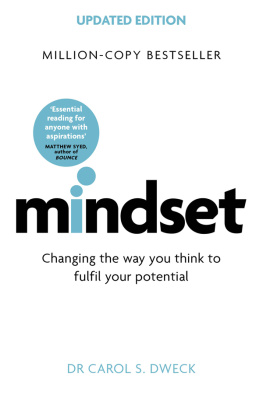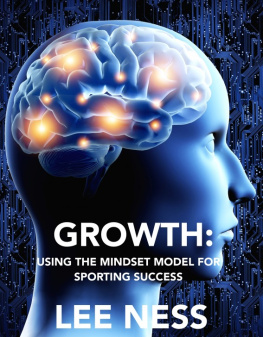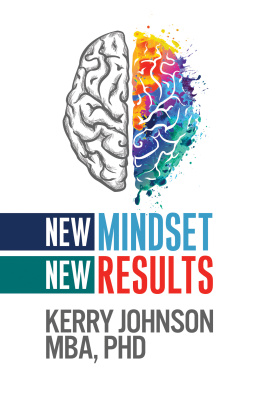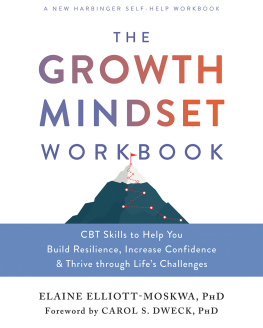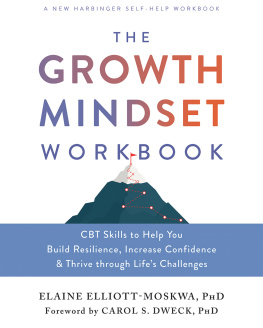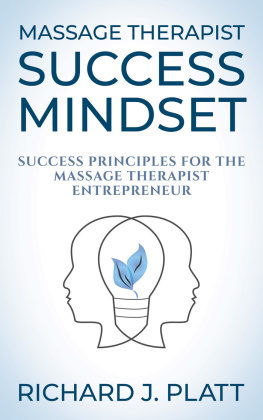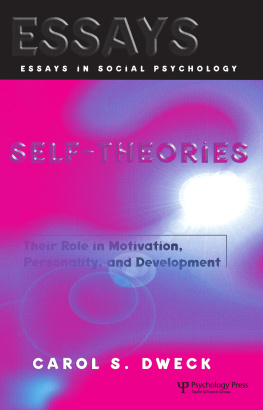MINDSET
The New Psychology of Success
CAROL S. DWECK, PH.D.

Random House | New York
CONTENTS
INTRODUCTION
O ne day, my students sat me down and ordered me to write this book. They wanted people to be able to use our work to make their lives better. It was something Id wanted to do for a long time, but it became my number one priority.
My work is part of a tradition in psychology that shows the power of peoples beliefs. These may be beliefs were aware of or unaware of, but they strongly affect what we want and whether we succeed in getting it. This tradition also shows how changing peoples beliefseven the simplest beliefscan have profound effects.
In this book, youll learn how a simple belief about yourselfa belief we discovered in our researchguides a large part of your life. In fact, it permeates every part of your life. Much of what you think of as your personality actually grows out of this mindset. Much of what may be preventing you from fulfilling your potential grows out of it.
No book has ever explained this mindset and shown people how to make use of it in their lives. Youll suddenly understand the greatsin the sciences and arts, in sports, and in businessand the would-have-beens. Youll understand your mate, your boss, your friends, your kids. Youll see how to unleash your potentialand your childrens.
It is my privilege to share my findings with you. Besides accounts of people from my research, Ive filled each chapter with stories both ripped from the headlines and based on my own life and experience, so you can see the mindsets in action. (In most cases, names and personal information have been changed to preserve anonymity; in some cases, several people have been condensed into one to make a clearer point. A number of the exchanges are re-created from memory, and I have rendered them to the best of my ability.)
At the end of each chapter and throughout the last chapter, I show you ways to apply the lessonsways to recognize the mindset that is guiding your life, to understand how it works, and to change it if you wish.
A little note about grammar. I know it and I love it, but I havent always followed it in this book. I start sentences with and s and but s. I end sentences with prepositions. I use the plural they in contexts that require the singular he or she. Ive done this for informality and immediacy, and I hope that the sticklers will forgive me.
Id like to take this chance to thank all of the people who made my research and this book possible. My students have made my research career a complete joy. I hope theyve learned as much from me as Ive learned from them. Id also like to thank the organizations that supported our research: the William T. Grant Foundation, the National Science Foundation, the Department of Education, the National Institute of Mental Health, the National Institute of Child Health and Human Development, and the Spencer Foundation.
The people at Random House have been the most encouraging team I could wish for: Webster Younce, Daniel Menaker, Tom Perry, and, most of all, Caroline Sutton, my editor. Your excitement about my book and your great suggestions have made all the difference. I thank my superb agent, Giles Anderson, as well as Heidi Grant for putting me in touch with him.
Thanks to all the people who gave me input and feedback, but special thanks to Polly Shulman, Richard Dweck, and Maryann Peshkin for their extensive and insightful comments. Finally, I thank my husband, David, for the love and enthusiasm that give my life an extra dimension. His support throughout this project was extraordinary.
My work has been about growth, and it has helped foster my own growth. It is my wish that it will do the same for you.
Chapter 1
THE MINDSETS
W hen I was a young researcher, just starting out, something happened that changed my life. I was obsessed with understanding how people cope with failures, and I decided to study it by watching how students grapple with hard problems. So I brought children one at a time to a room in their school, made them comfortable, and then gave them a series of puzzles to solve. The first ones were fairly easy, but the next ones were hard. As the students grunted, perspired, and toiled, I watched their strategies and probed what they were thinking and feeling. I expected differences among children in how they coped with the difficulty, but I saw something I never expected.
Confronted with the hard puzzles, one ten-year-old boy pulled up his chair, rubbed his hands together, smacked his lips, and cried out, I love a challenge! Another, sweating away on these puzzles, looked up with a pleased expression and said with authority, You know, I was hoping this would be informative!
Whats wrong with them? I wondered. I always thought you coped with failure or you didnt cope with failure. I never thought anyone loved failure. Were these alien children or were they on to something?
Everyone has a role model, someone who pointed the way at a critical moment in their lives. These children were my role models. They obviously knew something I didnt and I was determined to figure it outto understand the kind of mindset that could turn a failure into a gift.
What did they know? They knew that human qualities, such as intellectual skills, could be cultivated through effort. And thats what they were doinggetting smarter. Not only werent they discouraged by failure, they didnt even think they were failing. They thought they were learning.
I, on the other hand, thought human qualities were carved in stone. You were smart or you werent, and failure meant you werent. It was that simple. If you could arrange successes and avoid failures (at all costs), you could stay smart. Struggles, mistakes, perseverance were just not part of this picture.
Whether human qualities are things that can be cultivated or things that are carved in stone is an old issue. What these beliefs mean for you is a new one: What are the consequences of thinking that your intelligence or personality is something you can develop, as opposed to something that is a fixed, deep-seated trait? Lets first look in on the age-old, fiercely waged debate about human nature and then return to the question of what these beliefs mean for you.
WHY DO PEOPLE DIFFER?
Since the dawn of time, people have thought differently, acted differently, and fared differently from each other. It was guaranteed that someone would ask the question of why people differedwhy some people are smarter or more moraland whether there was something that made them permanently different. Experts lined up on both sides. Some claimed that there was a strong physical basis for these differences, making them unavoidable and unalterable. Through the ages, these alleged physical differences have included bumps on the skull (phrenology), the size and shape of the skull (craniology), and, today, genes.
Others pointed to the strong differences in peoples backgrounds, experiences, training, or ways of learning. It may surprise you to know that a big champion of this view was Alfred Binet, the inventor of the IQ test. Wasnt the IQ test meant to summarize childrens unchangeable intelligence? In fact, no. Binet, a Frenchman working in Paris in the early twentieth century, designed this test to identify children who were not profiting from the Paris public schools, so that new educational programs could be designed to get them back on track. Without denying individual differences in childrens intellects, he believed that education and practice could bring about fundamental changes in intelligence. Here is a quote from one of his major books, Modern Ideas About Children, in which he summarizes his work with hundreds of children with learning difficulties:
Next page
